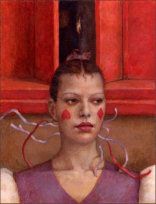Home
Gallery
Prints
Articles
About
Contact
CHRIS BENNETT
Artist
Articles

MISSING DOCTOR WHO - The Celestial Toymaker
and childhood's imaginative legacy
I remember seeing this when it was
originally transmitted.
Although I was only 7 or 8 years old, it left an impression that
has
stayed with me ever since. There was a marvellous 'Alice in
Wonderland' feel about it that, although I could not identify it
as such, appealed to my early responsiveness to 'mood' over
storytelling. Or, to put it more accurately, the way certain
stories
make concrete a state of mind.
Those dancing toy ballerinas have haunted me ever since; there
is something deliriously fascinating about the look of them; the
wish-bone shaped poses they made with their arms, the hearts
for red cheeks, the whole idea of coming under their spell and
dancing with them for eternity.
Yet there is another layer to this that even as a kid I somehow
responded to. These early episodes, embedded as they were in
a black and white hazy transmission and recorded in an
evidently studio-bound world do, for these reasons, intrinsically
enhance the 'other worldliness' quality of it all. It has always
struck me as curious how the ambient studio noise and echo,
the slightly claustrophobic sets and awareness of the heavy
studio cameras following the actors around (rather like sentient
robots sans cameraman) creates an atmosphere of make
believe almost by default. It’s as if early Doctor Who seems to
take place in the 'playroom' of the BBC studios long after
everyone has gone home. The Celestial Toymaker simply took
this state of affairs and ran with it.
I guess the 'quality' of this story is completely beside the point.
Even the best of Doctor Who, the very best, is well below a
good, competent 'straight' drama in terms of its production.
And by that I mean all the production elements, even if you
ignore the 'unspecial' effects. Just pick at random any episode
of the Jeremy Brett 'Sherlock Holmes' series and almost any one
of them will be superior to the pinnacle of what Doctor Who
has to offer in terms of consistency of acting, tightness of
script,
photography, music score, sets...everything.
My point is fundamentally that it is 'the idea' of Doctor Who that
enters your bloodstream. The whole lexicon of all the
components; scary, daft, witty, companions, the good 'ol Brig,
Benton, battered Dalek casings, Jo's marvellous legs, fantastic
costume design for sixpence, uncle Tewence, thoroughly
interesting Mr Hinchcliffe, enormously likable Mr Davison, the RT
forum, boring episodes, quite good episodes... on and on it
goes. But the most important thing in all this is its relationship
to
our childhood, To someone who has an enormous, incurable
soft spot for this show, the effect it had is forever tattooed on
our psyche.
So, whenever the old shows remembered from our childhood
are revisited, they never match up to the memory. They are like
marvelling at and being slightly shocked by the tiny desks when
we look at our infant school classrooms. It is the idea of Doctor
Who that is the most intriguing thing; no, that's not quite
accurate. It is something more resembling the 'heart' of it that I
have so much affection for. Such an innocent joy. It is that
simple really.
This brings me neatly to a point I would like to make about the
missing episodes in general: Most of them will stay missing
forever. There only testament to ever having existed being a
few broken fragments which are set into the surviving audio
tapes like one or two remains from a giant Roman vase.
I saw these episodes as a child and can never, ever see them
again. The memory of them, all that frightened me, thrilled me
and, most of all, inspired me is now part of my imaginative
world. A flickering black and white world once glimpsed
through the window of a mysterious, temperamental, heavy
box in the corner of a normal, surburban living room. And
although part of me would love to see them again, part of me
is glad they are gone, because even though much of our
childhood impression remains after seeing them in adult life,
something is taken away.
I shall forever dance with those toy ballerinas of The Celestial
Toymaker in my mind; half terrified of them and half in love with
them. If my adult mind were to see them again, they would
become actresses, lighting and sets. They would become the
fascinating world of archive TV and the musings about how
things had changed. All this would be fascinating in itself. But
they would have left that shadowy ballroom of spells where
they waltz with me in my childhood memory. I'm perfectly
happy not to be rescued...
TRIBUTE TO VERITY LAMBERT
In my mind’s eye there is an image of
childhood’s Christmas
tree. It is lit up and curiously resembles the central column of
the
TARDIS console. The tree still has many unopened presents at its
foot and the carpet is not yet covered in pine needles. On the
top there is a little fairy and, with a gasp, I realise the light
on
her wand has gone out and will shine no more.
Chris Bennett 2008